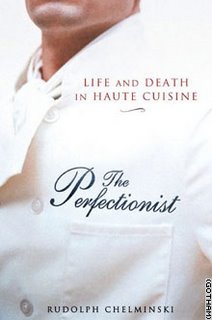The Perfectionist - Pretty Perfect!
Maybe, I have been too affected by my overbearing Jewish parents, but the importance of education has always maintained the house table in my brain's eatery. For a moment, forgetting the Frankfurt School, the principle is pertinent to hobbies, i.e. gastronomy as well. So, today, another book report, err, review...
The Perfectionist
by Rudolph Chelminski
Sadly, Bernard Loiseau is often remembered as the chef who took his own life when faced with the rumors that Michelin was planning to repossess his mecca, Cote d'Or's, third star, but his tragic demise eclipses one of the most significant culinary careers of the twentieth century. In his biography, The Perfectionist, Rudolph Chelminski goes far beyond recounting one man's life and cooking; the author has read his Donne and understands that in order to understand the trajectory of Cote d'Or and its proprietor, we must account for numerous other factors, subsequently, Chelminski provides his readers with an incredible portrait of modern French fine dining.
Much of the work is devoted not to Loiseau, but his peers, rivals, and mentors; hence, we are given an unprecedented peek into the life and works of Paul Bocuse, les freres Troisgros, Ferdinand Point, and Alain Ducasse to drop just a few of the names that pepper the pages. The writer reminds us that each entree and chef is one piece of a complex family tree no different than the development of social thought, music, literature, or art. Likewise, Loiseau's story is intertwined with Michelin and I found the thrity or so pages devoted to these fuhrers of food to be far more enlightening than Pascal Remy's entire tell-all tale.
The research is so thorough that Robert Caro might turn rose after a read. Chelmiski's prose is succinct, yet seductive. He neither settles for a simple journalistic regurgitation of the facts, nor does he fall victim to the temptation to supersede his station by mistaking his work for a grand novel. Recognizing the continental context of his chronicle, he inserts French terms and idioms when necessary, as opposed to watering down the work with weak translations. Most importantly, food and service is described in delicious detail: not an easy task! Translating the sensual to pulp and print is too often a sanitizing process, and while Proust can sleep easy (or not as ROTP explains,) Chelminski performs an admirable job. The description of jambonnettes or black truffle soup was sufficient to inspire a visit to Orbitz in the hopes of finding cheap air fare across the pond. Chelminski explains not just the taste and appearance of plates, but the evolution, preparation, and history of the cuisine.
Perhaps, the most exciting facet of the biography is intangible. Rudolph Chelminski tells a story that is partially concerned with a poor boy searching for fame and love in the city and the country, partially about fine dining, and partially about media pressures. The result is transcendent and a must read for anyone interested in cuisine or a simple Campbell-esque myth.

The Perfectionist
by Rudolph Chelminski
Sadly, Bernard Loiseau is often remembered as the chef who took his own life when faced with the rumors that Michelin was planning to repossess his mecca, Cote d'Or's, third star, but his tragic demise eclipses one of the most significant culinary careers of the twentieth century. In his biography, The Perfectionist, Rudolph Chelminski goes far beyond recounting one man's life and cooking; the author has read his Donne and understands that in order to understand the trajectory of Cote d'Or and its proprietor, we must account for numerous other factors, subsequently, Chelminski provides his readers with an incredible portrait of modern French fine dining.
Much of the work is devoted not to Loiseau, but his peers, rivals, and mentors; hence, we are given an unprecedented peek into the life and works of Paul Bocuse, les freres Troisgros, Ferdinand Point, and Alain Ducasse to drop just a few of the names that pepper the pages. The writer reminds us that each entree and chef is one piece of a complex family tree no different than the development of social thought, music, literature, or art. Likewise, Loiseau's story is intertwined with Michelin and I found the thrity or so pages devoted to these fuhrers of food to be far more enlightening than Pascal Remy's entire tell-all tale.
The research is so thorough that Robert Caro might turn rose after a read. Chelmiski's prose is succinct, yet seductive. He neither settles for a simple journalistic regurgitation of the facts, nor does he fall victim to the temptation to supersede his station by mistaking his work for a grand novel. Recognizing the continental context of his chronicle, he inserts French terms and idioms when necessary, as opposed to watering down the work with weak translations. Most importantly, food and service is described in delicious detail: not an easy task! Translating the sensual to pulp and print is too often a sanitizing process, and while Proust can sleep easy (or not as ROTP explains,) Chelminski performs an admirable job. The description of jambonnettes or black truffle soup was sufficient to inspire a visit to Orbitz in the hopes of finding cheap air fare across the pond. Chelminski explains not just the taste and appearance of plates, but the evolution, preparation, and history of the cuisine.
Perhaps, the most exciting facet of the biography is intangible. Rudolph Chelminski tells a story that is partially concerned with a poor boy searching for fame and love in the city and the country, partially about fine dining, and partially about media pressures. The result is transcendent and a must read for anyone interested in cuisine or a simple Campbell-esque myth.


0 Comments:
Post a Comment
<< Home